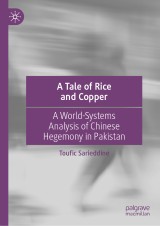Details
A Tale of Rice and Copper
A World-Systems Analysis of Chinese Hegemony in Pakistan|
128,39 € |
|
| Verlag: | Palgrave Macmillan |
| Format: | |
| Veröffentl.: | 28.06.2024 |
| ISBN/EAN: | 9789819735082 |
| Sprache: | englisch |
Dieses eBook enthält ein Wasserzeichen.
Beschreibungen
<p>This book explores Chinese investments in, and cooperation with Pakistan under the Belt and Road Initiative (BRI). Analyzing the BRI’s Pakistan limb, the China-Pakistan Economic Corridor (CPEC), the book illustrates the hegemonic tug of war between Washington and Beijing in Pakistan. There, China demonstrates its capacity to imprint its modus operandi onto peripheries through channels such as institutions, law, and currency, its economic dominance in production, trade, and finance through the control of quasi-monopolies on high-yielding economic processes (especially renewables and hard infrastructure) fostering trade surpluses which ultimately establish a net stream of inward revenue from Pakistan-as-periphery, military dominance to safeguard these revenue streams and furnish security to Islamabad, and cultural hegemony to socialize it at the level of the individual through media cooperation, state-wide language courses, and foreign education. The book addresses the need for an in-depth and comprehensive examination of a state under the Belt & Road Initiative, and will be of interest to scholars of China, South Asian affairs, international relations generally, and of geopolitics.</p>
<p>Chapter 1: Introduction.- Chapter 2: The Belt and Road Initiative and International Development.- Chapter 3: Features of Peripheralization and Hegemony in World Systems Analysis.- Chapter 4: Hegemonic Features of China the Belt and Road Initiative.- Chapter 5: A Song of Rice and Copper: The China-Pakistan Economic Corridor.- Chapter 6: The Balancers: Washington and New Delhi Navigate CPEC.- Chapter 7: Conclusion.</p>
<p><strong>Toufic Sarieddine</strong> was born in Lebanon. He studied at the American University of Beirut and worked at the United Nations High Commissioner of Refugees before earning his doctorate from Nagoya University’s Graduate School of International Development. His research focuses on the rise of China in the BRI era and its impact on US hegemony vis-à-vis the Global South with a focus on the Middle East and Southeast Asia. He currently resides in Nagoya, Japan, where he lectures at the Nagoya University of Foreign Studies and Nagoya City University. A bantering drummer, he listens to Fairouz, The Smiths, French Indie, and City Pop, depending on which world power is behaving the worst in a given week. He strongly recommends playing Sidereal Confluence.</p>
<p>This book explores Chinese investments in, and cooperation with Pakistan under the Belt and Road Initiative (BRI). Analyzing the BRI’s Pakistan limb, the China-Pakistan Economic Corridor (CPEC), the book illustrates the hegemonic tug of war between Washington and Beijing in Pakistan. There, China demonstrates its capacity to imprint its modus operandi onto peripheries through channels such as institutions, law, and currency, its economic dominance in production, trade, and finance through the control of quasi-monopolies on high-yielding economic processes (especially renewables and hard infrastructure) fostering trade surpluses which ultimately establish a net stream of inward revenue from Pakistan-as-periphery, military dominance to safeguard these revenue streams and furnish security to Islamabad, and cultural hegemony to socialize it at the level of the individual through media cooperation, state-wide language courses, and foreign education. The book addresses the need for an in-depth and comprehensive examination of a state under the Belt & Road Initiative, and will be of interest to scholars of China, South Asian affairs, international relations generally, and of geopolitics.</p>
<p><strong>Toufic Sarieddine</strong> was born in Lebanon. He studied at the American University of Beirut and worked at the United Nations High Commissioner of Refugees before earning his doctorate from Nagoya University’s Graduate School of International Development. His research focuses on the rise of China in the BRI era and its impact on US hegemony vis-à-vis the Global South with a focus on the Middle East and Southeast Asia. He currently resides in Nagoya, Japan, where he lectures at the Nagoya University of Foreign Studies and Nagoya City University. A bantering drummer, he listens to Fairouz, The Smiths, French Indie, and City Pop, depending on which world power is behaving the worst in a given week. He strongly recommends playing Sidereal Confluence.</p>
<p><strong>Toufic Sarieddine</strong> was born in Lebanon. He studied at the American University of Beirut and worked at the United Nations High Commissioner of Refugees before earning his doctorate from Nagoya University’s Graduate School of International Development. His research focuses on the rise of China in the BRI era and its impact on US hegemony vis-à-vis the Global South with a focus on the Middle East and Southeast Asia. He currently resides in Nagoya, Japan, where he lectures at the Nagoya University of Foreign Studies and Nagoya City University. A bantering drummer, he listens to Fairouz, The Smiths, French Indie, and City Pop, depending on which world power is behaving the worst in a given week. He strongly recommends playing Sidereal Confluence.</p>
outlines Chinese investments in Pakistan theorizes the future of Chinese investment in Pakistan offers a case study of Chinese overseas finance
Diese Produkte könnten Sie auch interessieren:

Cuba en la política exterior española: la construcción histórica de un consenso estratégico (1989-2004)

von: Raynier Pellón Azopardo

9,99 €

















